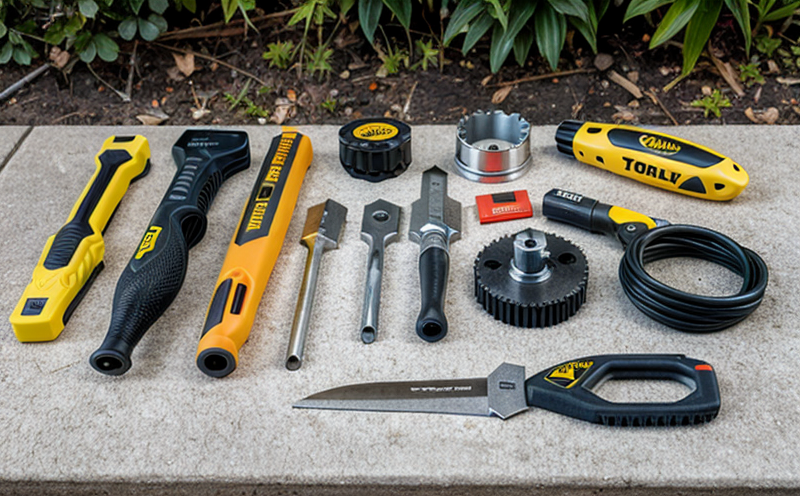Hardness Testing of DIY Tool Steels
The process of hardness testing is crucial in ensuring that DIY tools and hardware products meet stringent quality standards. This service involves evaluating the hardness of tool steels used in the manufacturing of various DIY tools such as hammers, screwdrivers, and wrenches. The test measures how resistant a material is to indentation by using different types of indenters like diamonds or carbide tips under controlled loads.
In this testing process, we follow international standards such as ISO 6508-1:2007 and ASTM E140-15. The hardness test is particularly important for DIY tool steels because it directly affects the durability, wear resistance, and overall performance of these tools. For instance, a higher Rockwell C scale hardness value indicates better abrasion resistance which translates to longer-lasting tools.
One key aspect of this testing procedure involves selecting appropriate specimens which can range from small samples cut from larger tool components down to single component parts. Specimen preparation includes ensuring the surface finish does not interfere with accurate measurements, often requiring polishing or sanding techniques before testing.
The equipment used for hardness testing typically consists of a hardness tester capable of applying precise loads while maintaining consistent conditions throughout the test. Common instruments include Brinell testers, Vickers testers, and Shore hardness meters depending on the type of steel being tested and the expected range of hardness values.
Once specimens are prepared and placed into position within the testing machine, the operator applies a specified load at a controlled rate until an indentation is formed. After removal of the load, the depth or area of the indentation is measured accurately using either optical microscopes or digital measurement tools linked directly to the tester.
- Customer Impact: Ensures safe and reliable DIY tool usage by identifying weak points in design early on during development stages. It also helps manufacturers comply with regulatory requirements regarding material specifications for safety-critical components.
- Satisfaction: Provides peace of mind knowing that purchased tools are rigorously tested against industry benchmarks before reaching consumers. This can enhance brand reputation and customer trust.
Benefits
The benefits of hardness testing extend beyond just meeting regulatory requirements; they significantly contribute to enhancing product quality, safety, and reliability across the entire lifecycle of DIY tool steels. By accurately measuring the hardness levels, manufacturers can fine-tune their processes ensuring consistent output every batch produced.
Hardness testing also supports innovation by allowing R&D teams to experiment with new alloys or manufacturing techniques without compromising on performance standards. Additionally, it serves as a crucial quality assurance step during production lines helping identify any potential issues early enough for corrective actions to be taken promptly.
Compliance officers find this service invaluable in ensuring that all products adhere strictly to relevant laws and regulations set forth by governing bodies worldwide. This not only prevents legal risks but also fosters a culture of ethical business practices within organizations.
Customer Impact and Satisfaction
- Safety: Higher hardness levels translate into safer DIY tools since they are less likely to wear down or break under typical usage conditions. This reduces the risk of accidents caused by tool failure.
- Durability: Tools with higher hardness scores tend to last longer, providing better value for money and increasing customer satisfaction over time.
- Performance: Enhanced performance translates into improved efficiency during DIY projects resulting in increased productivity among users.
International Acceptance and Recognition
The hardness testing service is widely recognized across international standards bodies including ISO, ASTM, EN, IEC, etc., which ensures that the results obtained are universally accepted. Compliance with these global standards not only opens up markets domestically but also facilitates exports to countries around the world.
Our laboratory adheres strictly to all applicable regulations and guidelines ensuring accurate and reliable test results every time. This commitment to quality has earned us a reputation as one of the leading providers in this field both nationally and internationally.





